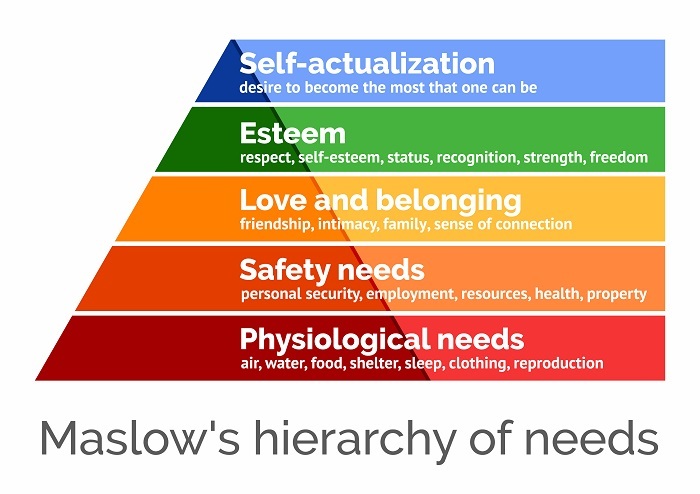
 Data Structure
Data Structure Networking
Networking RDBMS
RDBMS Operating System
Operating System Java
Java MS Excel
MS Excel iOS
iOS HTML
HTML CSS
CSS Android
Android Python
Python C Programming
C Programming C++
C++ C#
C# MongoDB
MongoDB MySQL
MySQL Javascript
Javascript PHP
PHP
- Selected Reading
- UPSC IAS Exams Notes
- Developer's Best Practices
- Questions and Answers
- Effective Resume Writing
- HR Interview Questions
- Computer Glossary
- Who is Who
Is Money the Sole Motivator at the Workplace?
Well, let me answer this question from the perspective of the great management scientist Maslow. We know him best for his needs hierarchy theory. Maslow's hierarchy of needs comprises a five-tier model of human needs designed in the form of a pyramid.

What is Maslow's need for hierarchy theory?
Maslow's hierarchy of needs theory explains the motivating factors that help fulfill human needs at different phases of their lives.
What are physiological needs?
Physiological needs are the basic needs that a human has, like food, water, clothes, sleep, etc. These are basic necessities that every person wants to have in his or her life.
What are the safety needs?
Once a person's basic needs are met, he wants to get secured. For example, he may want to have a house so that he can take care of his family as well.
What do love and belonging need?
Once a person feels secure, he develops a bond with the people in his surroundings and develops a relationship with them. He or she gets attached to different people.
What are esteem needs?
A person at this level is motivated only by recognition, name, and fame.
What is self-actualization?
A person at this level lives at his or her highest potential and only wants to get the most powerful position in his or her field.
Now let's see how the employee gets motivated towards the workplace in each and every phase of his lifecycle. This will let you all know to what extent money can motivate you at the workplace. I have tried to explain this from the perspective of Maslow's need hierarchy theory.
A breakdown of Maslow's hierarchy model is needed to understand the importance of money in the workplace.
The first category of need is physiological. The employees who fall into this category generally work to get two meals a day. So for them, it is obvious that money, and only money, is the sole motivator. They need money to satisfy their basic needs like hunger and thirst. Then, moving to the other level, we have safety, which deals with job security. For the employees who fall into this category, money is also the sole motivator because they need a secure job just to collect their salary regularly.
Now the employees who fall into both of these categories are either freshers or have experience of one or two years. For them, money plays a pivotal role in the organization. Then comes the third level, which is love and belongingness. Now the employees who fall into this category have given most of their precious time to the same organization. So obviously they have developed bonds with different people in the organization. They might have risen to a certain level because of that particular organization. They have gained and achieved materialistic pleasures because of the organization.
So they do not want to leave it. Here, the condition changes. Now, money is important, but not as a primary factor, and slightly less than that. Here, the employee can devote their precious time to the betterment of the organization. The employees who fall under this category develop a comfort zone from which they do not want to leave. If the payment is slightly less, they still manage because they know that it will get better soon. Now let's talk about the fourth level, which is esteem needs. Now, for the employees who fall into this category, rising and falling in perks and salary do not matter. For them, the thing that matters most is their reputation and dignity.
They can do anything to get in the good books of the customer. Now, employees in this category are in higher positions like CEO, MD, etc. For them, salary is just a secondary factor in work. They mostly work to secure and stabilize their position in the company. Now the fifth and most superior level is self-actualization. Now the employees who fall into this category are at the top of the organization's hierarchy and are the senior-most members of the organization. For them, money, perks, and benefits do not matter at all because they have a lot of alternative sources for those in case they do not get them. So what do these employees want? These employees desire to accomplish everything that they can.
They have the desire to become the most powerful person that they can be. So let's conclude that money or salary is not the sole motivator in the workplace. The need for it and its importance depends upon the time that you have spent in a particular organization and your level and position in it.
Conclusion
From the above study, we can conclude that money is important at the initial stages of an employee's career, but as his or her ladder of position increases, there are a lot of other things that are more important to him or her than money.

